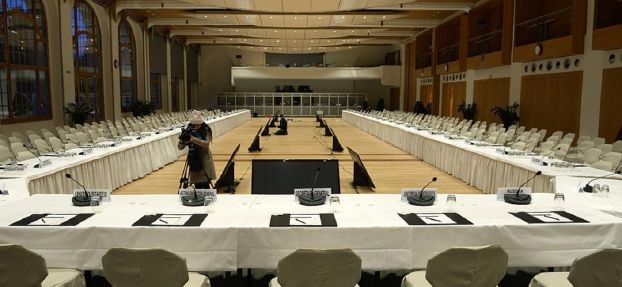Indirect talks in Geneva between representatives of the Syrian government and the opposition High Negotiations Committee opened in troubled fashion as the humanitarian situation overshadowed the preparatory stage to negotiations.
It was expected that the talks would begin with a meeting between UN special envoy Staffan de Mistura and the government delegation at the United Nations headquarters, but the meeting was postponed without offering a reason. Sources indicated that the government delegation had reservations about the composition of the opposition delegation, including the participation of defected general Asaad al-Zouabi as head of the delegation and Mohamed Mustafa Alloush, representative of the Army of Islam, as head negotiator.
The negotiations program includes a meeting between de Misutra and a delegation of the High Committee, which stressed that its members achieve an advance on the humanitarian issue before commencing indirect talks.
Both sides have rejected holding direct talks, and agreed for de Mistura to receive both delegations officially and separately in the UN headquarters. The UN announced the postponement of the expected meeting between the international envoy and the government delegation on Monday “to provide space” to meet the opposition delegation first. A source close to the government delegation said that the meeting was postponed until Wednesday. The source added that de Mistura informed the government delegation, which he previously met on Friday, that he could not meet them twice before meeting the opposition delegation.
De Mistura hopes to establish an indirect dialogue between the two sides with delegates moving between the two parties. When the date of the talks was set, it was announced that the process could last up to six months. The opposition is insisting on implementing humanitarian demands connected with the delivery of aid to blockaded areas and stopping the bombardment of civilians before starting the negotiations. It insists that the negotiations lead to a transitional stage which should end, in their opinion, with the removal of President Bashar al-Assad. However, the regime side has accused the opposition of timewasting, “a lack of seriousness” and attempting to “undermine the dialogue.”
The UN High Commissioner for Human Rights, Zeid Raad Al Hussein, said on Monday in Geneva that the war crimes carried out in Syria should not be part of any amnesty deal. He added: “We do have a principled position in the United Nations that no amnesties should be considered for those suspected of having committed crimes against humanity or war crimes,” adding that he hoped mediators stress this point during negotiations with the parties to the conflict.
In Washington, U.S. Secretary of State John Kerry said in a message directed to the regime and opposition delegations: “in light of what is at stake in these talks, I appeal to both sides to make the most of this moment, to seize the opportunity for serious negotiations, to negotiate in good faith.” He demanded the Syrian regime allow humanitarian aid into blockaded towns such as Madaya in the Damascus countryside.
It seems clear that Kerry is trying to give the opposition an indication that the United States will support their demands, in an attempt to move the talks along.
During his visit to Amman, the UK Foreign Secretary Phillip Hammond stressed that the Geneva talks should lead to a political transition away from Assad. Hammond said in a press conference with his Jordanian counterpart Nasser Judeh that the Syrian peace negotiations should lead to “a political transition away from Assad and end the suffering of the Syrian people.”
Thirty-five military factions announced “the legitimacy of the negotiations committee emerging from the legitimacy of the demands of the Syrian people,” confirming that their support for the committee “does not in any way mean delegating them to negotiate with the fundamentals of the revolution or concede any of its aims.”
In addition, the UN revealed that Syrian government forces recently proceeded to blockade Moadhamiya al-Sham, southwest of Damascus, adding 45,000 to the number of people cut off from humanitarian and medical aid in Syria.
Armed factions opposed to the regime have controlled Moadhamiya, which is on the southwestern outskirts of Damascus, since midway through 2012. Although regime forces blockaded it in 2013, it permitted food aid according to a local deal brokered in 2014. But the UN said that regime forces had closed the one entrance to the city on December 26, 2015, after allowing between 50 and 100 government employees to leave.
The UN said in a statement that because of the increase of restrictions imposed on the city at the end of 2015, it had returned to categorizing Moadhamiya as “blockaded” beginning from December 27, adding that it was still subject to sporadic shelling. The statement said that eight deaths had been recorded in the city since the start of January, resulting from a lack of appropriate medical care, while reports indicated cases of malnutrition although no deaths have been recorded.
The UN statement said there were 486,700 people under siege in Syria in areas controlled by the regime, Islamist fighters, and other armed factions, from among 4.6 million people who are in areas classified as “hard to reach”.
Opposition activists said that 100 people had been wounded in Moadhamiya from inhaling chlorine gas delivered by helicopters through barrel bombs on residential areas in the town. They added that regime forces blew up a tunnel under residential districts in the eastern area of the town of Moadhamiya, coinciding with helicopters dropping more than 66 barrel bombs on the southern and southeastern residential areas of the town, some loaded with chlorine gas.
This article was translated and edited by The Syrian Observer. Responsibility for the information and views set out in this article lies entirely with the author.


